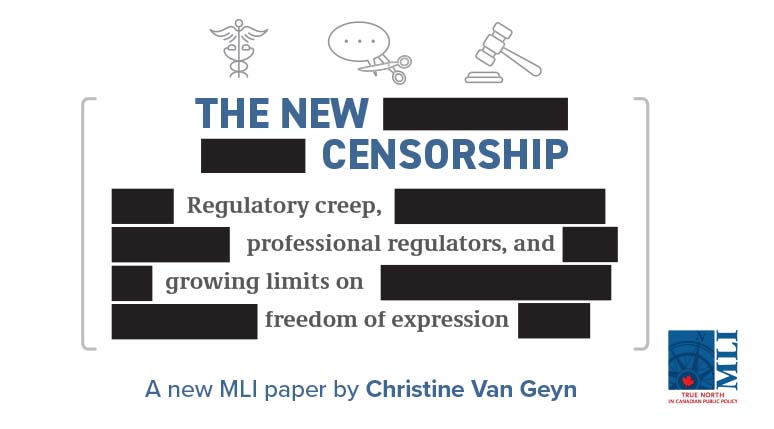By Christine Van Geyn
August 15, 2024
Executive Summary
There is a concerning trend emerging in Canada – a kind of “new censorship.” We see it in the creeping way that professional regulators are silencing those in regulated professions whom they consider guilty of heterodox speech or ideological non-conformity – even when those making the remarks are off-duty and are talking about things unrelated to their profession. The list of the censured includes lawyers, doctors, accountants, nurses, psychologists, and those in other regulated professions.
But professional regulators do not have unlimited and free-wheeling power to regulate everything their members say. Professional regulators are subject to the Charter of Rights and Freedoms when they make their decisions, and they may only regulate off-duty speech when it is in the public interest and when it relates to the profession and the specific professional practice. Regulators must be able to justify their decisions and those decisions must follow a logical chain of reasoning and be balanced. The struggle is that even when the courts review the decisions of professional regulators through a judicial review process, they tend to give wide deference to regulators’ decisions. And while regulators may have technical expertise in the specialized knowledge of the profession, they often don’t put much value on freedom of expression. The result is that professionals who express unpopular views are disciplined, regulators barely glance at the Charter, and courts are deferential when they review that discipline.
This paper considers one of the most infamous cases of professional regulation of off-duty speech in Canada: the dispute between Dr. Jordan Peterson and the College of Psychologists of Ontario. When Peterson took to social media to post his views about various political, social, and cultural issues, members of the public who disagreed with him weaponized the regulatory process and took their complaints to the College. The College sought to send Peterson to a re-education program at his own expense, which Peterson challenged in court, asserting that the punishment infringed upon his constitutional rights. However, the Ontario Divisional Court deferred to the College’s decision, emphasizing the mandate to maintain public trust and standards within the profession.
Contrast Peterson’s case to that of Carolyn Strom, a nurse who took to Facebook to publicly criticize the care her grandfather received at a nursing home and to advocate for general improvements in end-of-life care. Some nurses at the facility saw the posts and reported Strom to the Saskatchewan Registered Nurses’ Association, which found that her comments violated its code of ethics, which in turn led to disciplinary action. However, the Saskatchewan Court of Appeal overturned this decision, affirming Strom’s right to engage in public discourse about health care quality without fear of professional reprisal.
The outcomes in the two cases are very different. In part, this could be because the content of the speech was less subjectively controversial, but part of it could be the standard of review. In Strom the court applied a less deferential standard of review. This shows the importance of deference on the outcome of these expression cases.
Other cases where the mainstream acceptability of off-duty political speech was also at issue highlight the difference between Strom and Peterson. The right to freedom of expression is content neutral, and when someone speaks when they are off-duty and on a topic unrelated to the core mandate of the profession in question, it ought not to elicit discipline. But the practical reality is that regulators are human beings who see speech that is unpleasant or controversial and outside the mainstream as more requiring of discipline. In this paper, we compare the polarizing anti-abortion speech of Canadian nurse and social activist William Whatcott, which led to disciplinary action against him that required an appeal, with an anti-gun-crusading physician’s speech, which resulted in complaints that were immediately dismissed as vexatious. One could easily conclude that it was the subject matter of the political expression that influenced the different outcomes and processes in these two cases.
The paper also examines cases of speech by physicians related to COVID-19. The right to freedom of expression is fundamental to democracy, and it is partly through clashes with extreme and mistaken views that truth and the democratic vision remain vigorous and alive. This principle is vital in truth-seeking fields like science, medicine, law, and other professions that thrive on constructive debate and respectful disagreement. The discovery of new ideas would be hampered if professional regulators had the power to police their members’ speech for ideological conformity and political correctness. Yet during the pandemic, we saw that very thing transpire – speech that fell somewhere on the spectrum attracted discipline. This paper will consider where the lines are and should be drawn.
Among the challenges in regulating off-duty speech within regulated professions are the inconsistent application of regulatory standards and the insufficient consideration of Charter rights in disciplinary proceedings. However, some reforms are possible, including better training in fundamental freedoms for regulators, using the legal system to require that standards of review be more stringent, legislating explicit requirements for there to be a clear link to the profession in cases involving expression, and encouraging cultural shifts that emphasize the idea that freedom of expression is essential to professional integrity and democratic values.
Read the full paper here:







